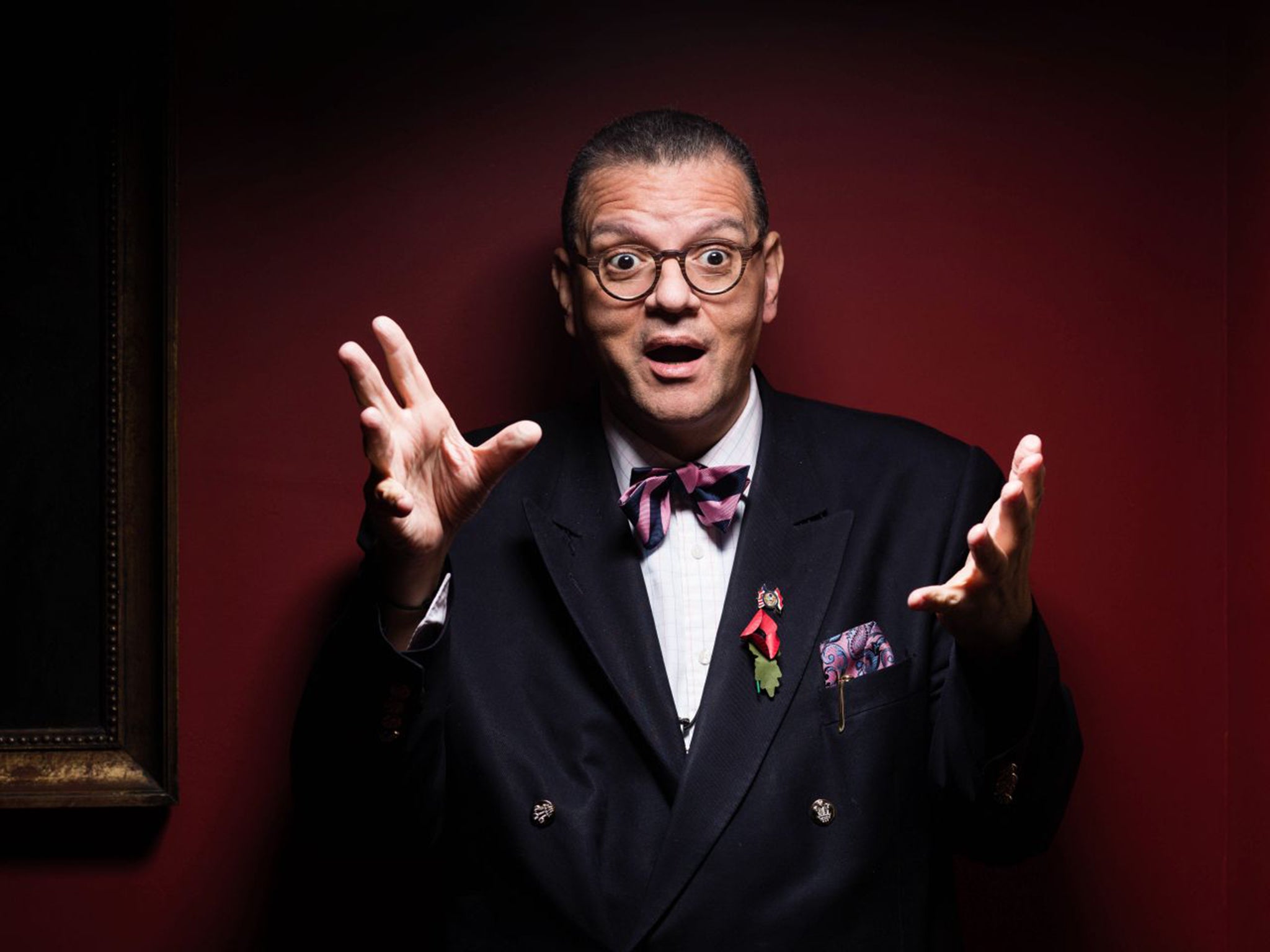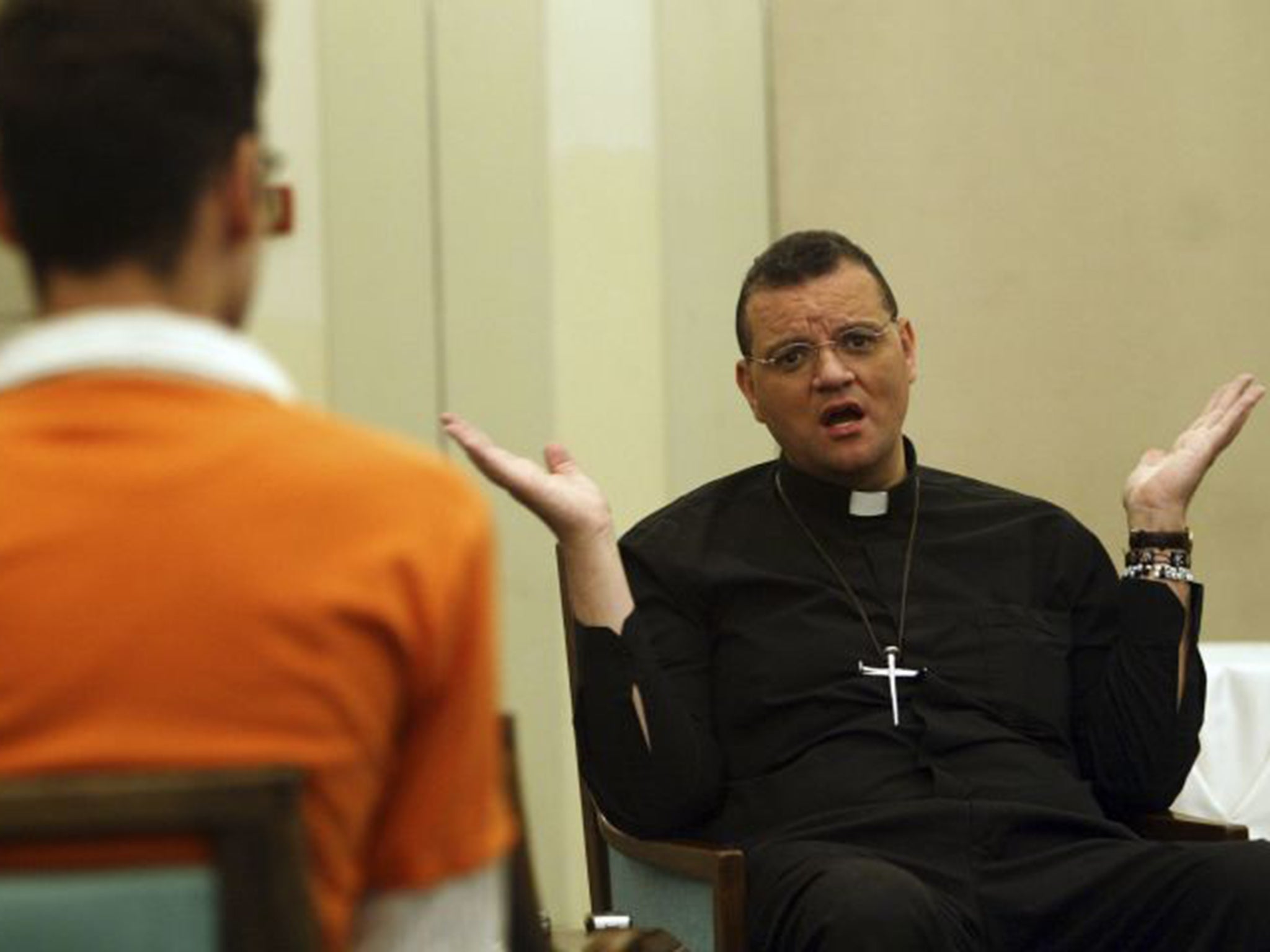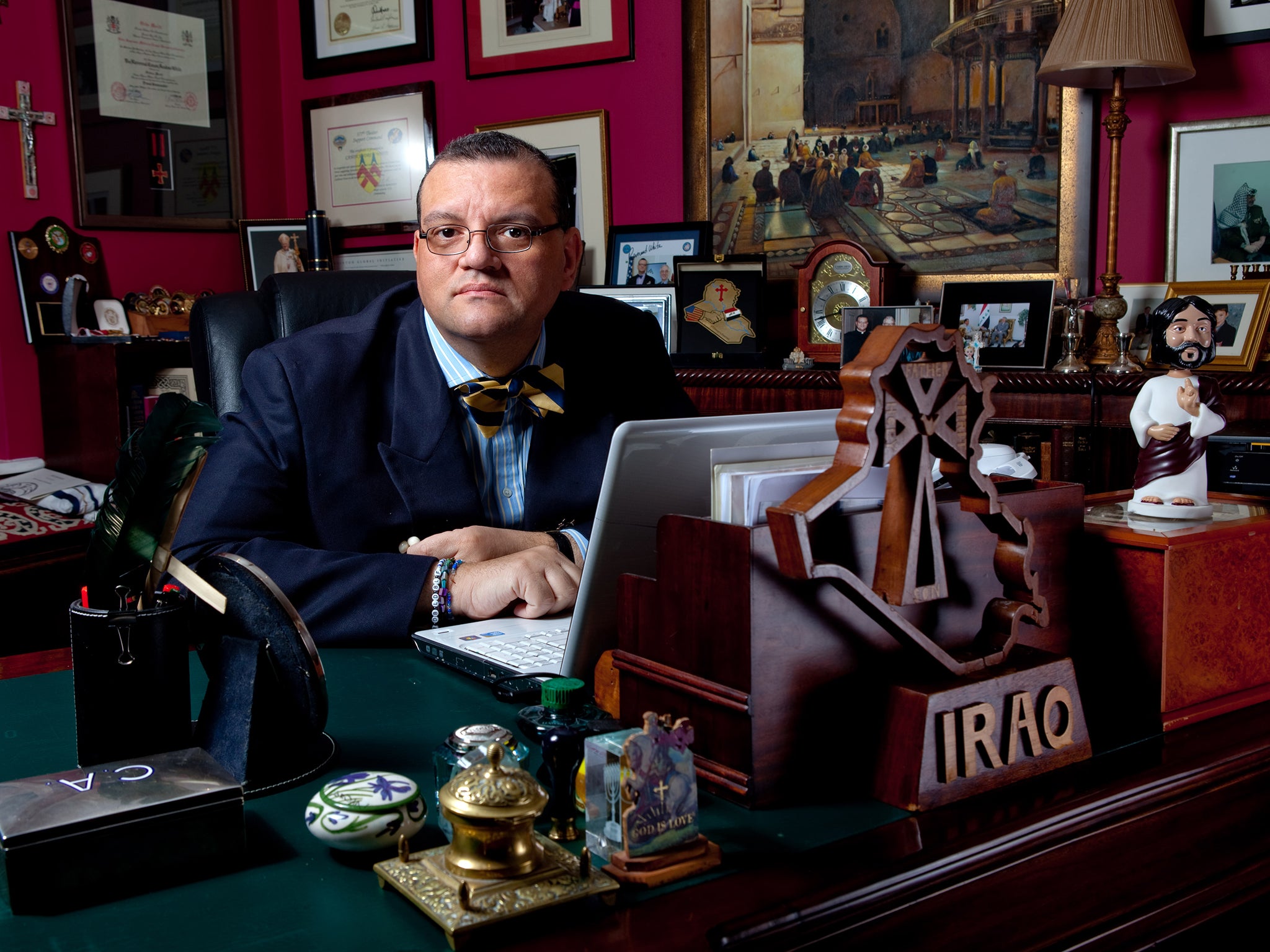Canon Andrew White: 'Vicar of Baghdad' on leading a church in Iraq and being in the crosshairs of Isis
Canon Andrew White has a remarkable faith in human nature, but in the face of so much cruelty, even he believes a line has been crossed

They were coming for him and his people. Friends were being killed or fleeing for their lives. So Andrew White did what he always does when faced with an enemy. “I invited the leaders of Isis [Islamic State] for dinner. I am a great believer in that. I have asked some of the worst people ever to eat with me.”
This extraordinarily self-confident priest is best known as the vicar of Baghdad, leader of a church in the chaos outside the protected Green Zone. He made his offer last year as the terrorist forces threatened to take the city. Did he get a reply?
“Isis said, ‘You can invite us to dinner, but we’ll chop your head off.’ So I didn’t invite them again!”
And he roars with laughter, despite believing that Islamic State has put a huge price on his head, apparently willing to pay $157m (£100m) to anyone who can kill this harmless-looking eccentric. Canon White was a doctor before he became a priest and could be one still, in his colourful bow-tie and double-breasted blazer with a pocket square spilling silk. But appearances are deceptive.
For the last two decades, he has worked as a mediator in some of the deadliest disputes on Earth, in Israel and Palestine, Iraq and Nigeria. He has sat down to eat with terrorists, extremists, warlords and the sons of Saddam Hussein, with presidents and prime ministers.
White has been shot at and kidnapped, and was once held captive in a room littered with other people’s severed fingers and toes, until he talked his way out of it. He is an Anglican priest but was raised a Pentecostal and has that church’s gift of the gab, even though multiple sclerosis (MS) makes him drawl like a posh barfly. “When I went on Radio 4 talking about Baghdad there were complaints because they thought I was drunk. I wasn’t!”

MS also affects his vision and his balance, but he claims to have come up with his own way of keeping the symptoms down, by injecting his own stem cells. A big man with a boyish enthusiasm, he declares himself afraid of nothing, not even the direct threat to his life.
“They’ve not sent an email telling me it’s off,” says White, 50, chuckling and looking at his travelling companion Terry, a former policeman. How does it feel to have that price on his head? “It feels good.” Terry raises his eyebrows and mutters, “While the head’s attached.”
It’s knockabout stuff, but let’s put this in context. White reopened St George’s church after the invasion of Iraq even though civil war raged and the diplomats and ex-pats who had once made up the congregation no longer dared to go there.
Iraqis came instead, and the congregation reached a peak of 6,500. They built a school, a clinic and food bank. White pledged to stay even as the sound of bombs grew louder. “We had Isis on the doorstep of Baghdad last year. I said to my people, ‘I will not leave you; don’t leave me.’ But many did leave me and they went to Nineveh and Mosul. Isis were there too. There was total mayhem.”
More than 1,200 men, women and children who worshipped with him have been killed in recent years, he says. Four boys he knew were beheaded because they refused to swear allegiance to Islam. The church caretaker was forced to watch as his five-year-old boy was cut in half.
There used to be 1.5 million Christians in Iraq but now there are only 260,000, he says. Some are calling it genocide. Surely he no longer believes that negotiations with Isis could work? White stares at me from behind owlish spectacles. “Can I be honest? You are absolutely right. You can’t negotiate with them. I have never said that about another group of people. These are really so different, so extreme, so radical, so evil.”
So what is to be done? “We must try and continue to keep the door open. We have to show that there is a willingness to engage. There are good Sunni leaders; they are not all evil like Isis.”
But surely there is only one logical conclusion to be drawn? He sighs, and answers slowly. “You are asking me how we can deal radically with Isis. The only answer is to radically destroy them. I don’t think we can do it by dropping bombs. We have got to bring about real change. It is a terrible thing to say as a priest.
“You’re probably thinking, ‘So you’re telling me there should be war?’ Yes!”
I am shocked by his answer, because this is a man who has risked his life many times to bring peace.
“It really hurts. I have tried so hard. I will do anything to save life and bring about tranquillity, and here I am forced by death and destruction to say there should be war.”
White had to be ordered to leave Baghdad at Christmas by his close friend the Archbishop of Canterbury, the Most Rev Justin Welby. “He said to me, ‘Andrew, look, what you are doing is so important and the reality is you are more use alive than dead. Come out of there. Don’t die.’”
They once worked together as directors of the centre for peace and reconciliation at Coventry Cathedral, going secretly to mediate in places such as the Niger Delta. Both wear crosses made out of nails taken from the cathedral after it was bombed during the war. Canon White wears his next to a pouch containing his US identity cards from the Green Zone.
“People always say I am reckless and fearless and never listen to anybody, but I always listen to my bishop. Maybe he knew better than me. Now he says I can go back in there as long as I don’t tell anybody what I am doing or when I am doing it.”
So White is on tour in this country promoting his new autobiography, My Journey So Far (Lion), appearing in Coventry tomorrow night and around the south of England all week. He has a home and a family in Sussex, but says this fortnight is his longest visit to Britain in years.
We are talking over sandwiches in the Cabinet Room of the Carlton Club, that Piccadilly sanctuary for high-ranking Conservatives, where the walls are lined with portraits of party grandees. One of them was the father of a nurse he used to go out with. “She was a good one.”
White has been close to the political establishment here and in Washington, briefing the Foreign Office about what he was seeing in Baghdad. These days he is the president of his own Foundation for Relief and Reconciliation in the Middle East (frrme.org), working in the place to which many of his congregation fled.
“I see myself as the pastor of the Iraqi refugee community in Jordan. I am providing them with food, housing, education for their children and a clinic to give them healthcare.”
The passion in his voice is magnified by the effort it takes to form the words properly. “There was one boy called Mario, whose daddy had been killed by Isis. He said to me, ‘Will you be my daddy now?’ I said, ‘Yes, of course.’ I would care for him, I would love him, I would be there as his support.” White has done the same for other children. “They all see me as their daddy. Whatever they ask for, I provide. That is part of the job of being a father.”
His home is now in Jordan, he says. But what about his wife and two sons in this country? “My eldest son is now at Cambridge. My youngest son is at home, and as long as he can get to see the Rugby World Cup Final, he is happy. My Muslim assistant Dr Sarah Ahmed and my little boy get on brilliantly and she has kind of adopted him. So we have a very broad relationship with our children, both the ones I care for in the Middle East and those here.”

His eldest, Jacob, once invited “Yes-Sir Arafat” to his fifth birthday party because he often saw the Palestinian leader on television with his father, as White mediated negotiations with the Israelis. Arafat didn’t go to the party, but was moved by the letter and sent an autographed keffiyeh (scarf) as a present.
How much time does White spend with his boys? “Normally, I see them every six weeks. Jacob used to say to me if I was home too long, ‘Daddy, time to go back to work now.’ They don’t know any different. They have never had me there all the time.”
How does his wife, Caroline, feel about all this? “Great,” he says in a voice that suddenly sounds tight and small. “Until things went really bad with Isis, she has never worried about me. The boys had never worried until suddenly they found a whole load of police outside our house. They had heard something big might be coming. Oh, there are some mints here ….”
He has a habit of changing the subject dramatically when he’s unsettled by the question. Reaching for the mints, he spills the bowl. How is his health? “Well, I suppose I am ill, aren’t I? In theory. I’ve got multiple sclerosis and I should not be able to do anything like I do.”
White allowed himself to be a human guinea pig for a doctor at the clinic in the grounds of his church, who injected him with stem cells from his own body. “It transformed me overnight. The only thing it didn’t help was my balance.” He has to go back every six months for the treatment. “Everywhere else does research about it. We just do it.”
There are those who say he is reckless about his body, but also about his friends. Tariq Aziz, Saddam’s deputy prime minister (and a Christian by heritage), was one of those. “I used to go and see him in his palace, then in his prison cell. I organised his funeral when he died.”
Aziz was “a bad person” admits White, but adds: “I know the regime was awful, but in a way I really did love him. He was a special person.” What does that mean? “To me, personally. I used to talk to him about anything.”
Some will be outraged by that, but Canon White does not care. He really does believe in loving his enemies – even when they put a price on his head, and when war seems inevitable. “Sometimes the impossible can happen,” he says, looking for hope.
“If you want to make peace, you can’t just do it with the nice people. Nice people don’t cause the wars.”
Join our commenting forum
Join thought-provoking conversations, follow other Independent readers and see their replies
Comments